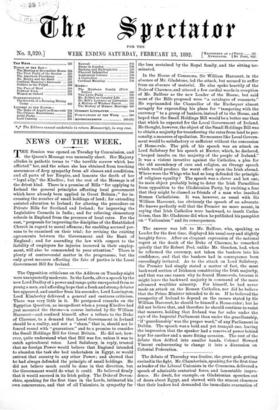The answer was left to Mr. Balfour, who, speaking as
Leader for the first time, displayed his usual easy and slightly haughty force. After an eloquent expression of the national regret at the death of the Duke of Clarence, he remarked quietly that Sir Robert Peel, unlike Mr. Goschen, had, when he reformed the currency, not taken the bankers into his confidence, and that the bankers had in consequence been exceedingly irritated. As to the attack on Lord Salisbury, the Premier had simply stated a matter of fact, the most backward section of Irishmen constituting the Irish majority, and. that was one reason why he feared Home-rule, because it might leave the backward majority in command of the more advanced wealthier minority. For himself, he had never made an attack on the Roman Catholics, nor did he believe that the Prime Minister intended to do so. If he believed the prosperity of Ireland to depend on the causes stated by Sir William Harcourt, he should be himself a Home-ruler; but he did not believe that, and therefore he should continue to resist that measure, holding that Ireland was far safer under the iegis of the Imperial Parliament than under the guardianship, "if 'guardianship' was the proper word," of any Parliament in Dublin. The speech was a bold and yet tranquil one, leaving the impression that the speaker had a reserve of power behind kept for another and a more fitting occasion. The rest of the debate then drifted into smaller hands, Colonel Howard Vincent endeavouring to change it into a discussion on Colonial Federation.


































